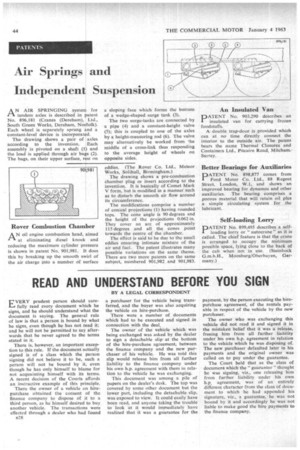READ AND UNDERSTAND BEFORE YOU SIGN
Page 46

If you've noticed an error in this article please click here to report it so we can fix it.
BY A LEGAL CORRESPONDENT
EVERY prudent person should carefully read every document which he signs, and he should understand what the document is saying. The general rule of law is that a person is bound by what he signs, even though he has not read it; and he will not be permitted to say afterwards that he never agreed to the terms stated in it.
There is, however, an important exception to this rule. If the document actually signed is of a class which the person signing did not believe it to be, such a person will not be bound by it, even though he has only himself to blame for not acquainting himself with its terms. A recent decision of the Courts affords an instructive example of this principle.
There the owner of a vehicle on hirepurchase obtained the consent of the finance company to dispose of it to a third person, as he himself desired to buy another vehicle. The transactions were effected through a dealer who had found R28 a purchaser for the vehicle being transferred, and the buyer was also acquiring the vehicle on hire-purchase.
There were a number of documents which had to be executed and signed in connection with the deal.
The owner of the vehicle which was being exchanged was asked by the dealer to sign a detachable slip at the bottom of the hire-purchase agreement, between the finance company and the new purchaser of his vehicle. He was told this slip would release him from all further liability to the finance company under his own h.p. agreement with them in relation to the vehicle he was exchanging.
This document was among a pile of papers on the dealer's desk. The top was covered by some other document but the lower part, including the detachable slip, was exposed to view. It could easily have been read, and anyone taking the trouble to look at it would immediately have realized that it was a guarantee for the payment, by the person executing the hirepurchase agreement, of the rentals payable in respect of the vehicle by the new purchaser.
The owner who was exchanging this vehicle did not read it and signed it in the mistaken belief that it was a release, freeing him from all further liability under his own h.p. agreement in relation to the vehicle which he was disposing of. The new purchaser defaulted later in his payments and the original owner was called on to pay under the guarantee.
The Court held that as the class of document which the " guarantor " thought he was signing, viz., one releasing him from further liability under his own h.p. agreement, was of an entirely different character from the class of document to which hc had appended his signature, viz., a guarantee, he was not bound by it and accordingly he was not liable to make good the hire payments to the finance company.








































































































